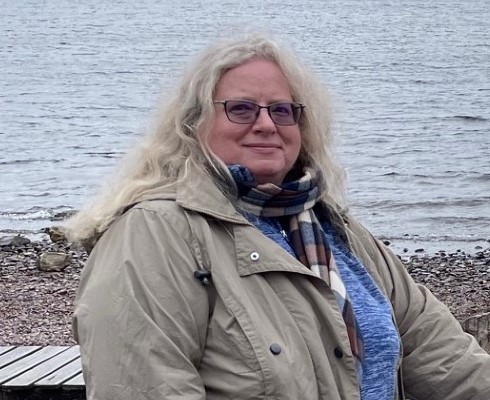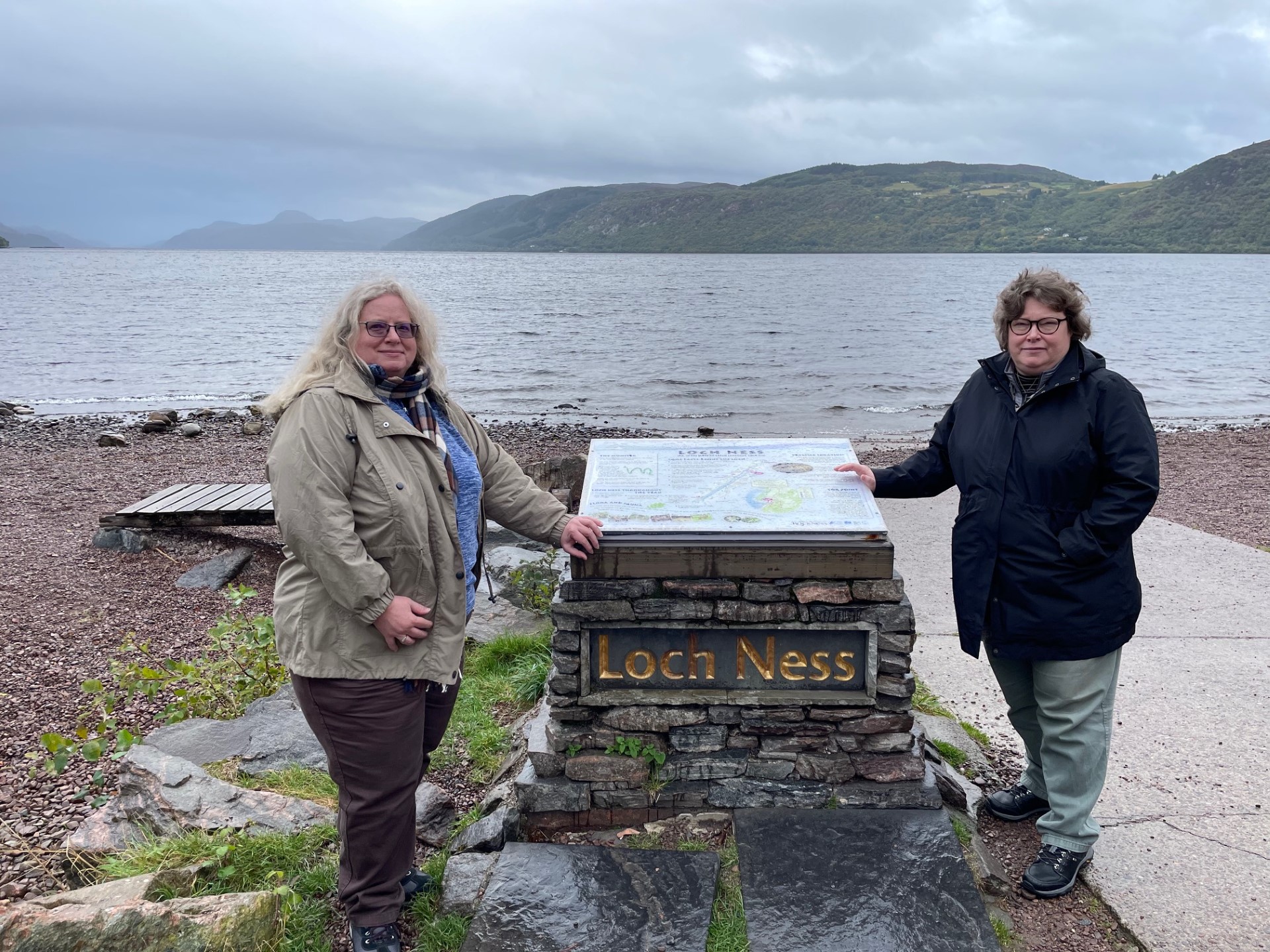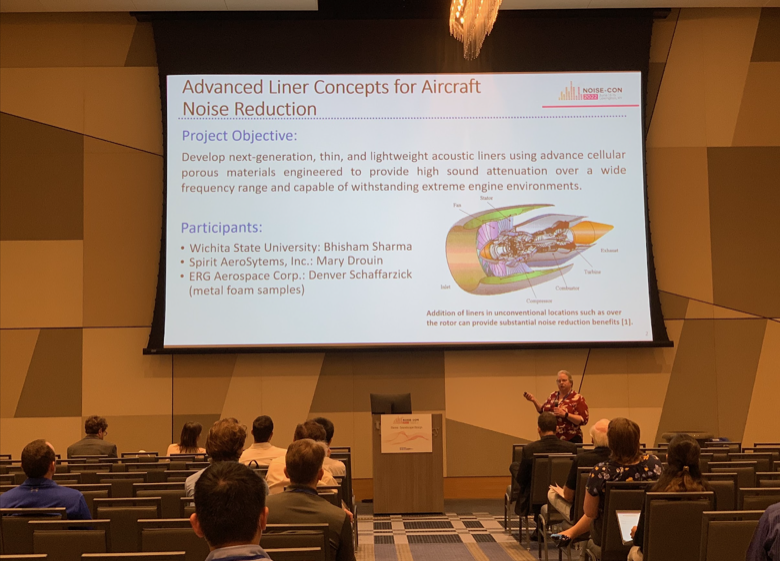Alumna Spotlights — Mary Drouin

Featuring Alumni from the University of Memphis
Department of Physics and Materials Science
Mary Drouin received a B.S. (Physics) and M.S. (Physics) from Memphis State University in 1991 and 1993, respectively. Upon graduating, I began my career at Boeing in the Measurement Group of Manufacturing Research and Development. During this time, I worked primarily in acoustic measurement, supporting design, construction and implementation of specialized inspection equipment. The equipment is used to validate the performance and design of the acoustic treatment used for noise abatement in jet engines. Depending upon the component and the specific inspection required, these systems required working with optics, air flow, lasers, and/or sound. As such, the Physics background was highly beneficial as it provided at least the basic theory for each of these disciplines.
Moving into Propulsion Analysis shortly before the formation of Spirit AeroSystems during a divestiture of the Wichita Site from the Boeing Company, I began working in the Acoustics Lab. Working in the lab involves shop support, material qualifications, new product development, and research and development activities. This has included the development of empirically-based models to predict acoustic impedance, boundary layer testing for drag coefficient determination, sonic fatigue testing, and grazing flow impedance testing.
After moving to Wichita for work, I took up wheel thrown pottery as a hobby, and have been teaching pottery part-time for the last 10 years at Wichita City Arts which is part of the city department of arts and recreation. In addition to pottery, I have been traveling both internationally and domestically with the last trip being a 10 day trip around Scotland with my sister, Theresa.
Gustav Borstad: What piqued your interest in physics?
Mary Drouin: I was always interested in science and how things worked. Watching classic science fiction with my family and looking at how things were done especially when they would discuss the scientific aspect of things was always fun to me. I loved classic Star Trek, and in particular, the character of Spock and how he used science to contribute to resolving the challenges they faced at different times. Although at the beginning, I didn’t know the different scientific disciplines and it was just science so the specific interest in Physics came later.
GB: When did you know you wanted to study physics?
Mary Drouin: My older sister, Theresa, majored in Physics, and I got to see what she was doing and was fascinated by it.
GB: Were your classes and experiences, particularly at the undergraduate level, what you expected? Or were you surprised by what you learned and experienced?
Drouin: I am not sure I had any specific ideas of what to expect other than what I had seen from the work my sister did. I was surprised by the variety of classes available and the different disciplines, such as Optics, Thermodynamics, and Astrophysics, that were covered under the overall umbrella of Physics. The chance to run some of the classical experiments was also very eye opening, and led to a greater admiration for the ones who first conducted them and the dedication and patience they had to pursuing their craft.
GB: If something about the Physics program at the University of Memphis really impacted you positively, what was it and what effect did it have?
Drouin: The opportunity to learn from truly dedicated professors was a great one. I also appreciated the chance to assist in research and lab instruction at an undergraduate level. I did not think I would have either of those opportunities at that level, and it made a big difference in the decision to continue for graduate level work in Physics rather than a different field.
GB: How has studying physics helped you professionally (and even personally!)? Does physics have any effect on your hobbies and personal interests?
Drouin: Professionally, my initial job out of school was in the field of Measurement Research and Development with the Boeing Company. My initial manager had several projects that were focused on acoustics, and believed someone with a Physics background would have an easier time picking it up than someone with a straight Engineering background. So Physics helped me get my first real job. Overtime, I have specialized in acoustics working on qualifying processes and equipment used to make the linings used for sound abatement in jet engines and working on modeling codes for the prediction of the acoustic response of new lining materials and processes.
 |
| Mary (left) and her sister, Theresa (right, also a Alumna of UofM Physics) pause for a picture to document their visit to Loch Ness in Scotland. |
GB: What are your past and current professional roles? Has your preparation as a physicist equipped you to pursue and succeed in your desired career path? Did you integrate physics with other skills and disciplines in an interesting or unique way that may inspire students to see physics and its possibilities in a new light?
Drouin: I briefly taught at a high school level before moving into working in industry. My initial position with Boeing was in the area of Manufacturing Research and Development with a focus on development of inspection systems for some of the proprietary processes used in production. These systems required various applications in the fields of optics, acoustics, and laminar/turbulent flow. The physics background enabled the successful completion of these projects, and led to the increased focus and interest in the acoustics aspects. My current position is as a Propulsion Engineer in the acoustics laboratory with Spirit AeroSystems, Inc. The acoustics focus of my current position has been interspersed with a variety of other disciplines related to the jet engine propulsion. I have had the opportunity to work on all aspects of the manufacturing environment from support of production and new programs to research and development activities. Collaboration with local universities has also provide the chance to participate in research funded by a NASA grant and the chance to present at NASA Acoustics Working Group Meeting at Langley this past March.
GB: Do you have any advice for a student who is considering physics as a major?
Drouin: Be open to the possibility that depending upon the career you choose, you may end up a “hidden physicist”. My current job designates me as an engineer, but that does not mean that physics has not played a critical part in my career. Keep your mind open to the possibilities that are out there and don’t allow yourself to be limited to a single definition. If you see something that interests you that you think could be a good fit for your skills, take a chance on it.
GB: Do you have any guidance or encouragement for students already in the program?
Drouin: I did not anticipate the industrial aspects/nonteaching possibilities of a physics degree when I first got it. I assumed I would get some industry experience and then go into teaching with the benefit of some experience to share with the classroom. I thought that an industry position would not prove to be a long term possibility, and that teaching would be the field in which my education would be most applicable. That being said, once I got into industry and had the opportunity to stay, I decided to stay. It has been a rewarding career, but also one with unexpected challenges due to the cyclic nature of the aircraft industry. Trying to be prepared for volatility in the current environment, whether it be academic, business, or government work, is an ongoing but unavoidable challenge. Developing ways to cope with this volatility is something you will need to do regardless of the field you choose. I have found having an outside interest (mine is wheel thrown pottery) has helped with that and that physics has also been surprisingly applicable to that endeavor as well. With that in mind, try not to lock yourself into preconceived ideas of what you have to do or think you have to do or perceived limitations of what you can do.
 |
| Mary Drouin presenting scientific work at Noise-Con in 2022. |
GB: Any other special experiences you want to share?
Drouin: During my career, I have had the opportunity to present at multiple conferences associated with different professional organizations. These included the AIAA (American Institute of Aeronautics and Astronautics), Noise-Con (Institute of Noise Control Engineering), and SAE (Society of Automotive Engineers). I have coauthored multiple papers and am listed as a co-inventor on one patent. (Portable Acoustic Impedance Measurement System – 6,134,968, October 24, 2000).
With respect to professional organizations, I am a member of the AIAA and SWE (Society of Women Engineers).
GB: Thank you for your time and for the lessons and experiences that you have shared.
Patents and Recent Publications
Patents and Recent Papers include:
- Portable Acoustic Impedance Measurement System United States Patent No. 6,134,968, Granted: October 24, 2000 (Patent held by Spirit AeroSystems)
- Drouin, M., Sharma, B. “Experimental investigations on the acoustical performance of open-celled metal foams under grazing flow”, Noise-Con 2022, June 13-15, 2022, Lexington, KY, NC2022-681.
- Eversman, W., Drouin, M. “Observations on Impedance Eduction in a Grazing Flow Duct Facility,” 28th AIAA/CEAS Aeroacoustics Conference, June 14-17, 2022, Southampton, UK, AIAA Paper AIAA-2022-2999
- Eversman, W., Drouin, M. “Refinement of Impedance Models for Single and Two Degree of Freedom Linings Based on Grazing Flow Duct Predictions and Measurements,” 28th AIAA/CEAS Aeroacoustics Conference, June 14-17, 2022, Southampton, UK, AIAA Paper AIAA-2022-2966
- Lomte, B. Sharma, M. Drouin, D. Schaffarzick, Sound Absorption and Transmission Loss Properties of Open-Celled Aluminum Foams with Stepwise Relative Density Gradients, Applied Acoustics, Vol 193, 2022
Drouin: Thank you.
